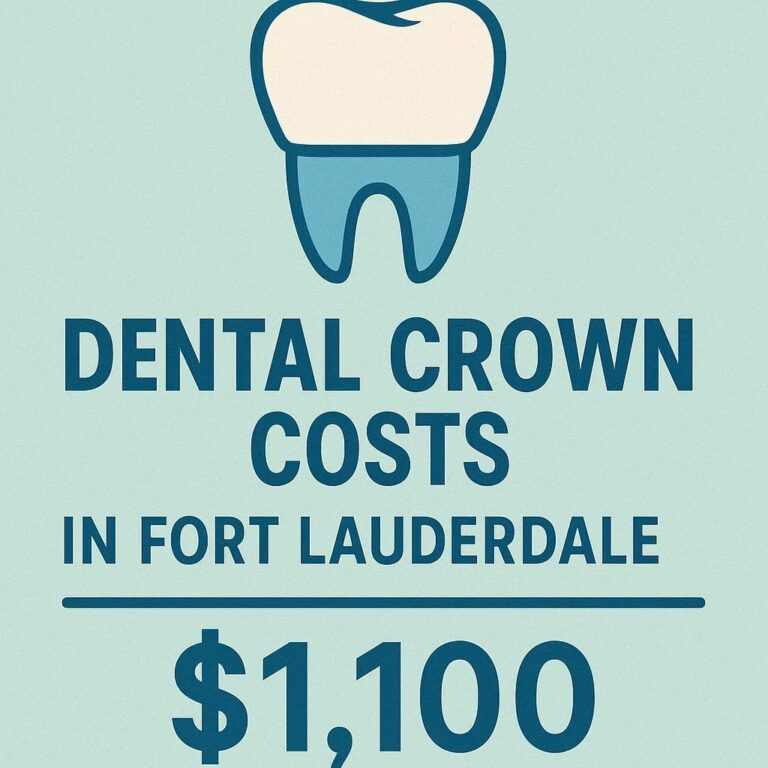A Comprehensive Guide to types of dental crowns and cost, and Considerations
For many people, a dazzling smile is a symbol of confidence and overall well-being. But what happens when a chipped, cracked, or weakened tooth threatens the integrity and aesthetics of your grin? Dental crowns offer a remarkable solution, restoring both the function and beauty of your teeth. This in-depth guide delves into the world of dental crowns, exploring the different types available, their associated costs, and crucial factors to consider when making this important dental decision.

The Vital Role of Dental Crowns
A dental crown, also known as a cap, is a custom-made restoration that encases a damaged, weakened, or severely discolored tooth. It acts like a protective helmet, shielding the tooth from further wear and tear while restoring its functionality and natural appearance. Crowns play a multifaceted role in oral health, offering a multitude of benefits:
- Strength and Durability: Crowns reinforce compromised teeth, preventing them from further fracturing or breaking. This is particularly crucial for teeth that have undergone extensive root canals or significant decay.
- Improved Functionality: Crowns allow you to chew effectively and speak clearly, restoring normalcy to your everyday activities.
- Enhanced Aesthetics: Crowns can be crafted to mimic the natural color and translucency of your teeth, creating a seamless and cosmetically pleasing result. This is especially valuable for restoring front teeth that are critical for a confident smile.
- Alignment and Bite Correction: In some cases, crowns can be used to correct minor bite problems and improve tooth alignment.
Unveiling the Diverse Landscape of Dental Crowns
Dental crowns come in a variety of materials, each offering unique advantages and considerations. Let’s explore the most common types of dental crowns:
- Metal Crowns:
- Material: Traditionally crafted from high-strength gold alloys or other metal combinations, these crowns are renowned for their exceptional durability and longevity.
- Advantages: Unmatched strength makes them ideal for molars that endure significant chewing forces. They are also less susceptible to chipping or fracturing.
- Disadvantages: The metallic color can be aesthetically unappealing, particularly for front teeth. Additionally, some individuals may have metal allergies that preclude their use.
- Porcelain-Fused-to-Metal (PFM) Crowns:
- Material: These crowns combine the strength of a metal substructure with a layer of tooth-colored porcelain on the exterior.
- Advantages: PFM crowns offer a good balance of aesthetics and durability. The porcelain exterior provides a natural-looking finish, while the metal base ensures long-lasting performance. They are a popular and cost-effective option for both front and back teeth.
- Disadvantages: The metal base can sometimes show through the porcelain, especially at the gumline, resulting in a less than ideal cosmetic appearance.
- All-Porcelain Crowns:
- Material: Constructed entirely from high-quality porcelain, these crowns prioritize aesthetics, mimicking the natural translucency and color of teeth.
- Advantages: All-porcelain crowns offer the most natural-looking results, making them the preferred choice for restoring front teeth.
- Disadvantages: While improved in recent years, all-porcelain crowns may not be as strong as PFM or metal crowns, making them more susceptible to chipping or breaking, particularly with heavy chewing forces.
- Gold Crowns:
- Material: Traditionally crafted from pure gold or gold alloys, these crowns offer exceptional biocompatibility and are less likely to cause allergic reactions.
- Advantages: Highly durable and biocompatible, making them suitable for individuals with metal allergies. The gold color can be aesthetically pleasing for some patients.
- Disadvantages: The cost of gold crowns can be higher compared to other options. Additionally, the metallic color may not be desirable for everyone, especially for front teeth.
- Zirconia Crowns:
- Material: Fabricated from zirconium dioxide, a biocompatible and strong ceramic material, these crowns provide a balance between aesthetics and strength.
- Advantages: Zirconia crowns offer excellent durability, natural aesthetics, and are well-tolerated by gums. They are a popular choice for both front and back teeth, especially for patients with metal allergies.
- Disadvantages: The cost of zirconia crowns can be slightly higher compared to PFM crowns.
Comparison of Dental Crown Materials
| Material | Advantages | Disadvantages | Ideal For |
|---|---|---|---|
| Metal | Exceptional durability, good for molars | Unattractive metallic color, potential allergies | Back teeth |
| Porcelain-Fused-to-Metal (PFM) | Balance of aesthetics and strength, cost-effective | Metal base might show through porcelain | Front and back teeth |
| All-Porcelain | Most natural-looking | Less durable than other options | Front teeth |
| Gold | Biocompatible, |
Factors Influencing the Cost of Dental Crowns
Understanding the cost of dental crowns is crucial for making informed financial decisions. However, it’s important to remember that the price tag can vary significantly based on several factors:
- Type of Crown Material: As explored earlier, different crown materials possess varying properties, impacting their cost. Generally, metal crowns are the most affordable, followed by PFM and zirconia. All-porcelain crowns tend to be on the higher end, while gold crowns can be even more expensive due to the material’s inherent value.
- Location and Experience of Dentist: The geographical location of your dentist’s practice can influence the cost. Dentists in high-cost-of-living areas may charge more compared to those in rural locations. Additionally, the experience and expertise of your dentist can also play a role in the overall fee.
- Complexity of the Procedure: In some cases, additional procedures might be necessary before placing a crown. For instance, if the underlying tooth requires a root canal or extensive tooth structure needs to be built up, these additional treatments will add to the overall cost.
- Dental Insurance Coverage: Dental insurance plans can offer varying degrees of coverage for dental crowns. Some plans might cover a portion of the cost, while others might not offer any coverage at all. It’s essential to meticulously review your dental insurance plan to understand your coverage specifics for dental crowns.
- Lab Fees: The dental laboratory that fabricates the crown will also have associated fees. These costs can vary depending on the lab’s location and the complexity of the crown design.
Here’s a table providing a general cost range for different crown materials. Remember, these are estimates, and the actual price you pay can differ based on the factors mentioned above.
Estimated types of dental crowns and cost
| Material | Cost Range |
|---|---|
| Metal | $1,000 – $3,000 |
| Porcelain-Fused-to-Metal (PFM) | $800 – $2,500 |
| All-Porcelain | $1,500 – $3,000 |
| Gold | $2,000 – $4,500 |
| Zirconia | $1,200 – $3,500 |
Considerations Beyond Cost: Choosing the Right Crown Material
While cost is undoubtedly a significant factor, it shouldn’t be the sole deciding element when choosing a dental crown material. Here are some additional considerations to keep in mind:
- Durability and Strength: Consider the location of the tooth receiving the crown. Back teeth endure significant chewing forces, so prioritizing strength might be more important. For front teeth, aesthetics might be a higher priority, but some level of durability is still necessary.
- Aesthetics: If the crown is being placed on a front tooth, a more natural-looking material like all-porcelain or zirconia might be preferable. Discuss your cosmetic goals with your dentist to determine the best option for achieving a seamless and aesthetically pleasing result.
- Biocompatibility: For individuals with metal allergies, biocompatible options like zirconia or gold crowns would be the most suitable choices.
- Your Lifestyle: If you grind or clench your teeth, a more durable material like metal or zirconia might be recommended to withstand the additional pressure.
When making your final decision, discuss all these factors with your dentist. They can assess your individual needs, oral health status, and budget to recommend the most suitable crown material for you.
The Dental Crown Procedure: What to Expect
The dental crown placement process typically involves multiple appointments. Here’s a general overview of what to expect:
- Consultation: During the initial consultation, your dentist will thoroughly examine your teeth, x-rays might be taken, and the need for a crown will be determined. They will discuss the different types of crown materials, their pros and cons, and answer any questions you may have.
- Tooth Preparation: At the next appointment, your dentist will numb the area around the tooth and prepare it for the crown. This might involve removing decay, shaping the tooth to accommodate the crown, and possibly placing a temporary crown to protect the tooth until the permanent one is ready.
- Impression Taking: An accurate impression of the prepared tooth and surrounding dentition will be taken. This impression is sent to a dental laboratory where the custom crown will be fabricated.
- Crown Placement: Once the permanent crown is received from the lab, your dentist will check the fit, color, and ensure it functions properly. Any necessary adjustments will be made before permanently cementing the crown onto the tooth.
Caring for Your Dental Crown: Ensuring Longevity
With proper care, dental crowns can last for many years, often exceeding 10-15 years. Here are some essential tips for maintaining your crown and maximizing its lifespan:
- Practice good oral hygiene: Brushing twice daily with a soft-bristled toothbrush and flossing once a day are crucial for removing plaque and food debris that can contribute to decay around the crown.
- Use a toothpaste formulated for crowns: Some toothpastes are specifically designed for crowns and bridges. These toothpastes are less abrasive and help protect the crown material from wear and tear.
- Avoid using your teeth for tasks other than chewing: Don’t use your teeth to crack nuts, open bottles, or chew on hard objects. These actions can damage the crown or the underlying tooth.
- Schedule regular dental checkups and cleanings: Visiting your dentist for regular checkups and cleanings allows them to monitor the condition of your crown and address any potential issues promptly.
- Be mindful of bruxism: If you grind or clench your teeth, talk to your dentist about wearing a nightguard. This can help protect your crown and other teeth from damage caused by bruxism.
Potential Complications of Dental Crowns
While dental crowns are a highly successful dental procedure, some potential complications can occur. These include:
- Sensitivity: You might experience temporary sensitivity to hot or cold after the crown is placed. This usually subsides within a few weeks.
- Loose Crown: Over time, the cement holding the crown in place can loosen. If this happens, contact your dentist for recementing the crown.
- Chipped or Broken Crown: Although durable, crowns can chip or break, especially if subjected to excessive force. In such cases, the crown might need to be repaired or replaced.
- Allergic Reaction: In rare cases, some individuals might experience an allergic reaction to the metal used in certain crown materials.
If you experience any persistent pain, discomfort, or loose feeling around your crown, consult your dentist promptly for evaluation and treatment.
Addressing Your Concerns: Frequently Asked Questions (FAQs)
Here are some frequently asked questions regarding dental crowns:
- How long does the dental crown procedure take?
The entire process typically involves multiple appointments. The consultation and tooth preparation might take around 30-60 minutes each. The final crown placement appointment usually takes less time, around 15-30 minutes.
- Will I experience any pain during the procedure?
Your dentist will administer local anesthesia to numb the area around the tooth, minimizing any discomfort during the procedure. You might experience some mild soreness or sensitivity after the anesthesia wears off, which can be managed with over-the-counter pain medication.
- What if I cannot afford a dental crown?
Dental insurance plans can offer varying degrees of coverage for dental crowns. Discuss your options with your dentist and explore potential payment plans they might offer to make the treatment more affordable.
- Are there alternatives to dental crowns?
In some cases, depending on the extent of damage, alternative options like fillings, inlays, or onlays might be suitable. However, crowns are generally the preferred choice for severely damaged or weakened teeth.
- How can I improve the aesthetics of my smile with dental crowns?
Crowns can be used to improve the color, shape, and size of teeth. Discuss your cosmetic goals with your dentist to determine if crowns are the right solution for achieving your desired smile.
Conclusion
Dental crowns offer a valuable solution for restoring the health, functionality, and aesthetics of compromised teeth. By understanding the different types of crown materials, their associated costs, and the overall treatment process, you can make informed decisions about this dental procedure. Remember, prioritizing good oral hygiene and regular dental visits are crucial for ensuring the longevity of your dental crown and maintaining a healthy smile.
You might also want to check out these articles for more ideas: dental crown


